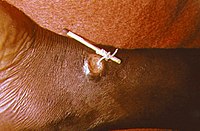
Photo from wikipedia
The global programme for the eradication of Guinea worm disease, caused by the parasitic nematode Dracunculus medinensis, has been successful in driving down human cases, but infections in non-human animals,… Click to show full abstract
The global programme for the eradication of Guinea worm disease, caused by the parasitic nematode Dracunculus medinensis, has been successful in driving down human cases, but infections in non-human animals, particularly domestic dogs (Canis familiaris), now present a major obstacle to further progress. Dog infections have mainly been found in Chad and, to a lesser extent in Mali and Ethiopia. While humans classically acquire infection by drinking water containing infected copepods, it has been hypothesised that dogs might additionally or alternatively acquire infection via a novel pathway, such as consumption of fish or frogs as possible transport or paratenic hosts. We characterised the ecology of free-ranging dogs living in three villages in Gog woreda, Gambella region, Ethiopia in April-May 2018. We analysed their exposure to potential sources of Guinea worm infection, and investigated risk factors associated with infection histories. The home ranges of 125 dogs and their activity around water sources were described using GPS tracking, and the diets of 119 dogs were described using stable isotope analysis. Unlike in Chad, where Guinea worm infection is most frequent, we found no ecological or behavioural correlates of infection history in dogs in Ethiopia. Unlike in Chad, there was no effect of variation among dogs in their consumption of aquatic vertebrates (fish or frogs) on their infection history, and we found no evidence to support hypotheses for this novel transmission pathway in Ethiopia. Dog owners had apparently increased the frequency of clean water provision to dogs in response to previous infections. Variations in dog ranging behaviour, owner behaviour and the characteristics of natural water bodies all influenced the exposure of dogs to potential sources of infection. This initial study suggests that the classical transmission pathway should be a focus of attention for Guinea worm control in non-human animals in Ethiopia.
Journal Title: Transboundary and emerging diseases
Year Published: 2020
Link to full text (if available)
Share on Social Media: Sign Up to like & get
recommendations!